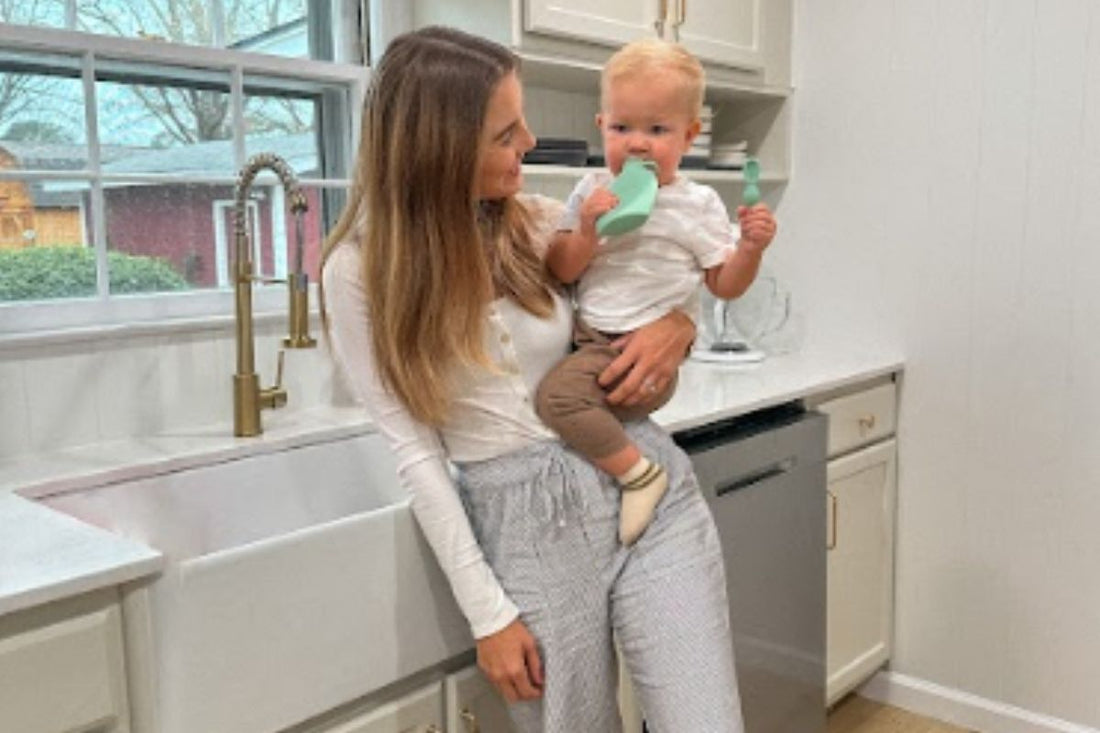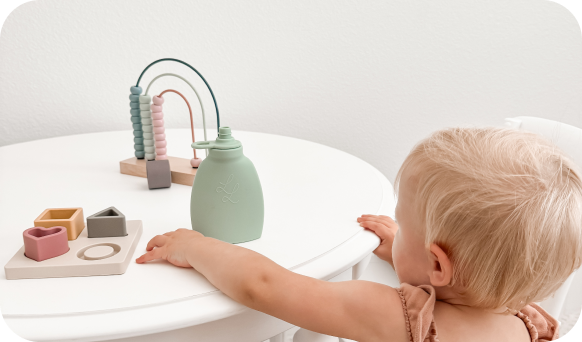What I Wish I Knew About Plastic Baby Food Pouches

When Theo was around six months old, I felt so proud stocking our pantry with what I thought were the “good” baby food pouches. Organic, colorful packaging, sweet little labels, it all felt like I was doing the right thing. I mean, they were everywhere. Moms in my playgroup swore by them. They were quick and clean, and my little guy loved them.
By the time he was 18 months old, those baby pouches were disappearing faster than a plate of cookies at a bake sale. I only began noticing things I couldn't ignore: blood sugar swings, constant constipation and an urge for more snacks. His moods would fluctuate and rather than being content, he would always want more.
That was the moment it occurred to me; maybe these pouches weren’t as ‘healthy’ as I thought. In this post, you'll find out why store-bought baby food pouches aren't always the best option and how easy swaps will help your little one eat healthily and feel good. Read on to learn more.
The Hidden Side of Store-Bought Baby Pouches
Here’s the thing I didn’t realize in the beginning: most store-bought baby pouches are highly processed. Even the organic ones often have fruit purées as the first ingredient, which means more sugar than you might think. That sugar isn’t like eating fresh fruit with fiber; it hits fast, spikes blood sugar and leaves kids hungry again way too soon.

Another surprise? The texture. These pouches are smooth to the point of being almost watery. Kids miss out on developing their chewing skills if they rely on them too much. And then there’s the packaging. A single baby food pouch might seem small, but multiply that by a few a day for months and the waste really adds up.
How It Affected Theo:
With Theo, I saw the effects firsthand:
- Big energy swings: He was jumpy one minute and then he was fussy and sleepy.
- Digestive issues: Constipation became a regular battle.
- Limited food variety: He kept wanting the same pouch flavors.
Looking back, I realize I had set him up for a cycle that was hard to break.
Learn more in The Hidden Dangers of Microplastics in Baby Food.
The Switch That Changed Everything
One day, after a particularly frustrating afternoon of baby snacking, I decided that enough was enough. I quit purchasing store-bought baby pouches and began making our own purees at home. In the beginning, Theo was not delighted. Just a few weeks later though, he began eating thicker, heartier mixtures and then more whole foods.
The magic happened when I replaced disposable pouches with reusable ones. I filled the reusable pouches with Greek yogurt, veggie purées like spinach, mashed avocado, and berry smoothies. They were still convenient and now I knew what was contained inside.
And here’s what changed:
- Better digestion: No more constipation battles.
- Steadier moods: Without those sugar spikes, Theo was calmer and more focused.
- Wider tastes: He started accepting veggies, beans, and proteins.
What I Wish I Knew Back Then
If I could go back and give my new-mom self a few tips, here’s what I’d say:

- Read labels carefully: Even “organic” pouches can be high in sugar and still come in plastic packaging.
- Think texture: Babies need a variety of food to develop oral motor skills.
- Watch portions: It’s easy for kids to overdo it when the pouch is sweet and smooth.
- Make it yourself: Homemade is fresher, healthier, and often cheaper.
- Invest in quality tools: A sturdy reusable pouch pays for itself quickly.
A Different Start for Julia
When Julia came along, I took a whole new approach. No store-bought baby food pouches, not even the “good” ones. She got real purées from the start, right in our own silicone reusable pouches. Blueberry mashed Greek yogurt. Butternut squash mixed with some chicken broth.
Applesauce that does not contain any sweeteners. She is even more daring than Theo was by her age. She’ll happily try new textures and flavors without fuss. And that’s no accident; it’s because we skipped the pouch habit.
Why Real Food in Reusable Pouches Works Better
Real food is more than just nutrients it’s flavors, textures and the experience of eating. With reusable pouches, I control:
- Ingredients: Only what I choose goes in.
- Texture: Gradually making blends thicker to get kids used to chewing.
- Sugar levels: More veggies, no fruit concentrates.
- Variety: From hearty soups to tangy yogurt blends.
And the best part? I’m not tossing empty plastic pouches in the trash every day.
A Few of My Favorite Homemade Pouch Ideas
These aren’t just healthier; they taste fresh, not cooked down like some store blends.

- Blend banana and spinach or avocado and oat milk to make a Spinach Banana Smoothie.
- Boil sweet potato and add cinnamon and a pinch of nutmeg to form a Sweet Potato Puree.
- To make a Berry Yogurt Blend, stir strawberries and chia seeds into Greek yogurt.
- Steam zucchini and apple and sprinkle with ginger to create a Zucchini Apple Purree.
Learn more in: Breakfast Smoothies That Keep Kids Full
Our Favorite Solution: The Little Smoothies System
That’s exactly why we created The Little Smoothies System. It’s our go-to for making and storing wholesome blends for the kids.
Here’s why I love it:
- It works for everything. You can use it for purées and smoothies, applesauce or yogurt.
- The design is kid-friendly. Little hands can hold it easily.
- It saves time. You can also create a batch and keep the leftovers and take one whenever you want.
- It helps the planet. You can wash it and reuse it without any waste.
It’s not about making your life difficult; it’s about healthy habits.
How to Transition Away from Store-Bought Baby Food Pouches
If your little one is used to store-bought baby food pouches, don’t worry, you can make the switch without a meltdown.
Here’s what worked for us:
Take it a bit at a time: Replace one of the store-bought pouches every day with something you make yourself.
Mix the familiar with the new: Get a favorite fruit and a veggie your child has not tired of yet and pair them.
Change the texture slowly: Start with smooth blends and gradually go to somewhat chunkier over a couple weeks.
Make it fun: Ask your child to fill the reusable pouches to make him/her feel a part of the process.
The Bigger Picture: Healthy Habits Start Early
When we feed our little ones real food from the start, we’re not just filling their bellies. We’re teaching them to enjoy flavors, try new things, and eat with variety. Skipping the plastic baby food pouch habit helped my kids:
- Develop better chewing and swallowing skills.
- Accept savory foods earlier.
- Avoid a constant sugar cycle.
And honestly? It’s easier than I thought.
Final Thoughts:
If I could go back, I’d skip the store-bought baby pouches from day one. Sure, they’re easy but they’re not the kind of “easy” that sets kids up for long-term health. With Theo, I learned the hard way that too many pouches can lead to sugar crashes, picky eating, and tummy troubles. With Julia, I knew that reusable pouches filled with real food are just as convenient and a whole lot better for their little bodies.
The switch wasn’t hard. It just took a little planning, a good system, and a willingness to rethink “convenience.” And now? Snack time is peaceful, nutritious, and something I do not mind. Since, at the end of the day, it is not only about feeding them now; it is about teaching them to love actual food in the long term.
Are you prepared to leave the plastic pouches behind? Feed your little ones the fresh and natural food they deserve. Start with our Little Smoothies System today!
References:
1. Amara Organic Foods. (n.d.). The (Ugly) Truth About Baby Food Pouches. Retrieved from
https://amaraorganicfoods.com/blogs/blog/the-ugly-truth-about-baby-food-pouches
2. KidsHealth. (n.d.). Hypoglycemia and Diabetes. Retrieved from
https://kidshealth.org/en/parents/hypoglycemia.html
3. Chicago Occupational Therapy. (n.d.). Feeding and Oral-Motor Development Milestones. Retrieved from
https://chicagooccupationaltherapy.com/resources/articles/feeding-and-oral-motor-development-milestones/
